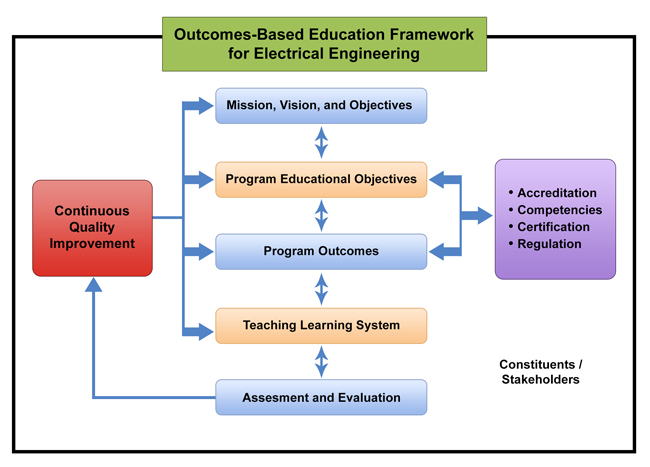Electrical engineering deals with the generation, transmission, distribution and utilization of electricity. It also deals with the design, operation and protection, maintenance and economics of electrical systems, with emphasis on ethical values to harness economically and safely the materials and forces of nature for the benefit of society and the environment.
The Department, as its continuing objective, provides the students with the necessary training, technical support facility and guidance to help them complete their degrees. With the combination of technical education and “hands-on” experience in an industry internship program, the students will graduate both well educated and trained, and are assured of a productive life as UE College students.


PROGRAM EDUCATIONAL OBJECTIVES
The University will produce Electrical Engineering graduates who are:
professionally competent and globally competitive;
equipped with technical competencies and are able to contribute to the country’s social and economic progress;
lifelong learners imbued with the UE core values of Excellence, Integrity, Professionalism, Teamwork, Commitment, Transparency, Accountability and Social Responsibility.
STUDENT OUTCOMES
Ability to apply knowledge of mathematics and science to solve engineering problems.
Ability to design and conduct experiments, as well as to analyze and interpret data.
Ability to design a system, component or process to meet desired needs within realistic constraints such as economic, environmental, social, political, ethical, health and safety, manufacturability, and sustainability, in accordance with standards.
Ability to function in multidisciplinary teams.
Ability to identify, formulate and solve engineering problems.
Understanding of professional and ethical responsibilities.
Ability to communicate effectively.
Broad education necessary to understand the impact of engineering solutions in global, economic, environmental and societal contexts.
Recognition of the need for and an ability to engage in lifelong learning.
Knowledge of contemporary issues.
Ability to use techniques, skills and modern engineering tools necessary for engineering practice.
Knowledge and understanding of engineering and management principles as a member and leader in a team, to manage projects in multidisciplinary environments.
THE ELECTRICAL ENGINEERING CURRICULUM
The Electrical Engineering curriculum is designed to develop engineers equipped with the knowledge in mathematics, natural and physical sciences, and engineering fundamentals. The language courses, social sciences and humanities were included to ensure that the eventual graduates would understand their important role in society. The course of Electrical Engineering in the curriculum covers generation, transmission, distribution and utilization of electricity. It deals with the design, operation, and protection, maintenance and economics of electrical systems and guidance of the ethical standard of practice and proper values.
The curriculum is so designed to enhance teaching and learning activities, encourage critical thinking, and develop creative leaders. The core and major courses of the curriculum teach and equip student with the necessary tools for solving problems in the field of Electrical Engineering.
CAREER OPPORTUNITIES
The graduates of Electrical Engineering may go into the following career opportunities:
THE LABORATORY
The laboratory equipment in the Electrical Engineering Department provides the necessary in-depth experience and training of students in electrical, electronic and computing equipment as well as experimental techniques and skills in the use of modern laboratories.
The Uni-train 1 equipment of Lucas-Nulle provides a powerful experiment and training platform of computer-based vocational and further professional training in the area of Electrical Engineering. It combines theory and practice to give highly efficient and effective learning environment with multimedia diversity.
The power Electronics and Drive System Technology of Lucas-Nulle is also a computer-based and practice-oriented training system that is modular in construction. The power electronics module provides a technology of switching and converting high levels of electrical power. It performs experiments ranging from the use of power diodes, thyristors and IGBTs; And with the use of digital controller, integrates the system into process control technology and allows excellent visualization of the degree of precision.
The Drive System echnology module gives primary training in electronics and mechatronic technology. It develops skills needed by the technicians and engineers in handling electrical machines and acquire know-how regarding their design, function, connection, connection configurations, characteristics and, in particular, their response to different loads.
The PowerLab Training System of Feedback Instruments, a practice-oriented training system, allows the study and investigation of the properties of DC and single-phase and three-phase AC machines and generators. Included in the training system are the single-and three-phase transformer training modules for industrial applications.
ACHIEVEMENTS
Philippine Accrediting Association of Schools, Colleges and Universities (PAASCU) Level II Re- Accredited
UE’s EE licensure exam topnotchers include Engrs. Jonathan M. Villorente (9th, April 2006) and Antonio A. Enrique Jr. (7th, April 2004), among many others.
FACULTY
Engr. Sinforoso D. Cimatu Jr. – Department Chair, Electrical Engineering
Faculty Members
UE College of Engineering-Caloocan
Angelita D. Guia
Dean
Dr. Paraluman G. Sim
Associate Dean-Engineering
Dr. Maria Amelia E. Damian
Associate Dean-Computer Studies and Systems
Engr. Edelito A. Handig
College Secretary
UE College of Engineering-Caloocan Dean’s Office
✆ Dean: (632) 8-367-4572 local 166
✆ Direct Line: (632) 8-365-4121
Associate Dean and College Secretary:
✆ 8-367-4572 local 167
✆ Direct Line: 8-365-4121
General UE CEng’g Caloocan email address:
✉ ceng.cal@ue.edu.ph
Department Chairs Office:
✆ UE Caloocan Trunkline 8-367-4572
✆ CE Department: local 171
✆ CpE Department: local 172
✆ ECE Department: local 181
✆ EE Department: local 170
✆ ME Department: local 169
✆ CS/IT Department.: local 200
Social Info

